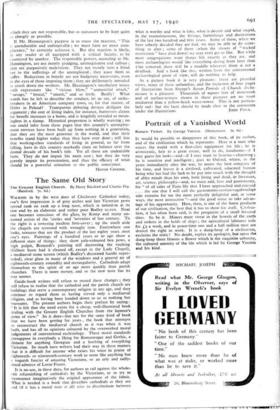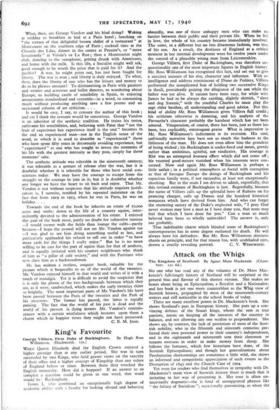Portrait of a Vanished World
Return Ticket. By George Vandon. (Heinemann. 78. 6d.) lr would be possible to disapprove of this book, of its author, and of the civilisation which he represents. Here is a man who enters the world with a first-class equipment for life ; he is aristocratic, heir to a great estate, well to do, handsome—if I may guess his looks—and—if I may trust to hearsay—charming ; he is sensitive and intelligent ; goes to Oxford, where, in the years immediately after the war, he meets the best company of his time, and leaves it a civilised, cultivated, educated human being who has had the luck to be put into touch with the thought of abler minds than his own, both living and dead, in literature, art, science, philosophy—and, we must add, love and gastronomy, for "of all sides of Paris life that I have approached and enjoyed . . . the one that I will call the gastronomo-erotico-vagabondage side remains for me the most perfectly delightful and, in some ways, the most instructive "—and the good sense to take advan- tage of his opportunity. Here, then, is one of the finest products of our civilisation, the best that it has to show for itself. Civilisa- tion, it has often been said, is the perquisite of a small leisured class. So be it. Miners must sweat in the bowels of the earth and stokers in the holds of ships ; the agricultural labourer toils for £2 a week, and in peace-time one and a half million men arc denied the right to work. It is a dung-heap of a civilisation, exclaims the critic! No doubt, replies its apologist, but upon the dung-heap there blooms a flower which is the exquisite urbanity, the cultured amenity of the life which is led by George Vandon and his kind. What, then, are George Vandon and his kind doing? Waking at midday to breakfast in bed at a Paris hotel ; lunching on "the terrace of that delightful brown chalet of a restaurant" at Montsouris on the southern edge of Paris ; cocktail time at the Closerie des Lilas, dinner in the centre at Prunier's, or "more luxuriously" at Voisin's or La Rue ; then a Montmartre night club, dancing to the saxophone, getting drunk with Americans, and home with the milk. Is this life, a Socialist might well ask, good enough to be worth the price that is paid for it? And the pacifist? A war, he might point out, has just been fought for liberty. The war is won ; and liberty is duly enjoyed. To what, then, does the liberty of one who has the leisure and money to do as he pleases amount? To dilettantising in Paris with painters and writers and actresses and ballet dancers, to wandering about Europe, to building castle of sensibility in Spain, to enjoying amusements standardised and eccentric—in a word, to consuming much without producing anything save a few poems and an occasional column of art criticism. . . .
It would be easy, I say, to censure the author of this book ; and yet I think the censure would be censorious. George Vandon is an inheritor of the aesthetic tradition. He trains his tastes, cultivates his sensibilities, and, believing with Pater that "not the fruit of experience but experience itself is the end" becomes in the end an experienced man—not in the English sense of the word, in which it is used to describe as " experienced " those who have spent fifty years in decorously avoiding experience, but " experienced " as one who has sought to invest the moments of his life with the greatest intensity as they pass, simply for those moments' sake.
The aesthetic attitude was tolerable in the nineteenth century; it was tolerable as a gesture of release after the war, but it is doubtful whether it is tolerable for those who have social con- sciences today. We may have the courage to escape from the struggle or the courage to join in it; but it is doubtful whether any longer we have the heart to sit back and enjoy. That Mr. Vandon is not without suspicion that his attitude requires justifi- cation is, I surmise, testified by his repeated insistence on the fact that from 1919 to 1923, when he was in Paris, he was on holiday. .
Towards the end of the book he inherits an estate of ro,000 acres and settle3 down to the life of a country squire, inter- mittently devoted to the administration of his estate. I enjoyed this part of the book most, partly no doubt for subjective reasons —I would sooner walk the fields than lounge the cafés—partly because—I hope the avowal will not set Mr. Vandon against me —I was glad to see him doing something useful at last, and particularly applauded his refusal to sell out in order "to have more cash for the things I really enjoy." But he is no more willing to be cast for the part of squire than for that of aesthete, and is equally irritated with his country neighbours who think of him as "a pillar of café society," and with the Parisians who now class him as a backwoodsman.
He has written a restless, unquiet book, valuable for the picture which it bequeaths to us of the world of the twenties. Mr. Vandon enjoyed himself in that world and writes of it with a touch of nostalgia. Yet it is difficult to avoid the suspicion that it is only the gloom of the two backgrounds between which they are, as it were, sandwiched, which makes the early twenties shine so brightly. The most important parts of Mr. Vandon's life have been passed between the Paris of the twenties and the Park of his ancestors. The former has passed, the latter is rapidly passing. The fact that the world of his past is dead and the world of his present is dying invests Mr. Vandon's reminis- cences with a certain wistfulness which bestows upon them a charm which in happier times they might not have possessed.
C. E. M. Joao.



































 Previous page
Previous page